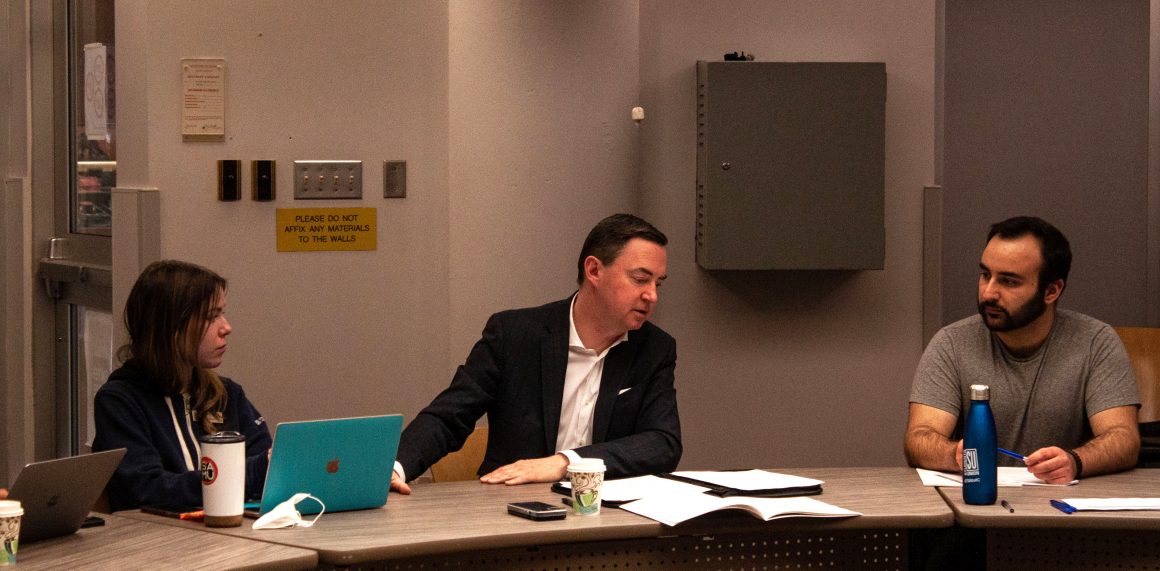
Town hall held with MLA Jason Copping sparks frustration with the 2023 budget
By Sheroog Kubur, March 8 2023—
On March 3, the Students’ Union hosted a town hall with Calgary-Varsity MLA Jason Copping for students to ask questions about healthcare, tuition and future job opportunities for students.
SU president Nicole Schmidt started the town hall by announcing the affordability measures that have been put in place since January. This including a two per cent cap on tuition increases in the 2024-25 academic year, $275 per month in support to students who already received the Alberta Student Grant, reducing student loan interest rates, extending the interest-free grace period to 12 months and increasing the repayment assistance plan threshold from $20,000 to $40,000 a year.
Copping outlined the government’s intentions for healthcare and post-secondary education in the 2023 budget. He highlighted “securing Albertans’ future” as a priority and the importance of diversifying jobs for future graduates. This includes creating jobs outside of the energy sector and investing in the finance, information technology and agricultural sectors and healthcare.
“When I taught in Haskayne, I was seeing tons of incredibly talented people graduating and they were finding jobs, but not here,” said Copping about his experience teaching and moving into politics. “I wanted to get involved in this process to put in place policies to address job creation in this province.”
Copping also emphasized the 2023 budget investing $6.3 billion in advanced education, a $23 million increase from the 2022 budget. He said the increase will go towards increasing the number of seats for medical school and residencies and overall investing in areas with the highest demand.
“As part of our Budget 2023, the theme around that is securing Albertans’ future. We will continue to invest in Alberta technology and innovation programs, continuing to invest in agrofood and manufacturing,” Copping said.
He also spoke about improving accessibility for healthcare relating to emergency medical service and surgery wait times. He hopes to improve these by focusing on keeping people out of the hospital instead of the current hospital-basis model.
“We have a hospital-based system, looking after people under the most-expensive doors who are the sickest, as opposed to keeping people out of the hospital — focusing on primary care,” Copping said.
Questions about tuition hikes dominated the question period, asking about how the affordability supports announced would impact students and what supports international students can expect. Copping clarified that the current plan involves “putting Albertans first” but will maintain dialogue with Schmidt about supporting international students.
Students also asked about how the government would support careers and job opportunities aside from in the medical and energy sector, specifically asking about graduate school for lawyers.
Students also asked generally about how the refocus of the healthcare system would impact them, singling out the lack of general care physicians and family doctors as a concern. Medical students raised concerns about expanding the number of seats but not the number of available residencies for students.
In response to the UCP budget for post-secondary institutions, Alberta’s NDP Advanced Education Critic David Eggen expressed his frustration in a press release following the town hall.
“This budget does nothing to address the effects on post-secondary schools and students over the course of four years of UCP cuts,” said Eggen. “The UCP has cut funding to advanced education by $1.2 billion over the past four years. Among other hardships, that significant cut has resulted in 5,000 less staff at post-secondary institutions.
“Students are struggling to make ends meet with tuition and the cost of living having increased dramatically under the UCP. In just two years, student debt will increase by $1.7 billion,” he continued. “Danielle Smith and the UCP are putting post-secondary education out of reach for many Albertans.”
